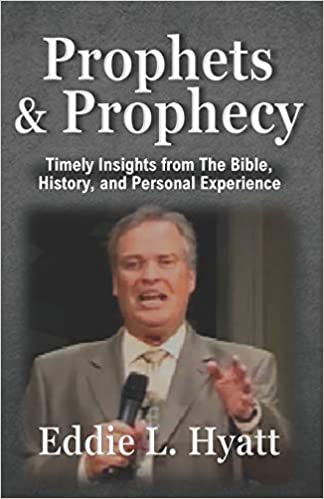Eddie Hyatt: Prophets and Prophecy
 Eddie L. Hyatt, Prophets and Prophecy: Timely Insights from the Bible, History, and My Experience (Grapevine, TX: Hyatt Press, 2021), 126 pages, ISBN 9781888435634.
Eddie L. Hyatt, Prophets and Prophecy: Timely Insights from the Bible, History, and My Experience (Grapevine, TX: Hyatt Press, 2021), 126 pages, ISBN 9781888435634.
Dr. Eddie Hyatt is a veteran in the Pentecostal Movement. He has written previously about the subject of spiritual gifts in his book 2000 Years of Charismatic Christianity. In Prophets and Prophecy he says that throughout its history the church has tended to go to extremes regarding prophetic ministry (page 5). In view of this he tells us why he wrote this book, “My purpose in writing this book is to strike a balance between openness and naiveté concerning prophecy and the miraculous gifts of the Spirit” (page 5). One thing that is clear in this book is that the author believes that the gifts of the Spirit are for today. He has personally had experience with them, he says that he has both given and received prophetic words (page 6). So he is not in favor of setting aside the gifts of the Spirit because of mistakes that have been made by some people who have practice them. Instead, he offers guidelines that will help minimize such mistakes.
The main body of the book is made up of 13 chapters. In the course of these chapters, Dr. Hyatt covers a number of key topics related to the subject of prophecy. In chapter one he looks at some of what the Bible says about the gifts of the Spirit, which includes the gift of prophecy. Here he includes information from the Greek text of 1 Corinthians 12 and tells us what these Greek words tell us about the gifts of the Spirit. In chapter 2 he contrasts Christian prophecy with pagan prophecy. Chapter 4 is given to the subject of “Learning To Think Critically Without Quenching the Spirit.” Chapter 7 deals with warning signs which indicate that a prophetic ministry has gone off track. These signs are: “When Prophecy is Used to Enhance the Status of a Movement and Its Leaders,” When Prophecy Becomes the Primary Means for Determining the Will of God,” “When Prophecy is Preoccupied With Images, Numbers, and Symbols,” “When Those Prophesying Are Not Open to Testing or Correction,” and “When Prophecy Becomes a Replacement for the Scriptures and Common Sense.” Chapter 11 is given to the subject of “The Prophethood of All Believers.” In chapter 12 he sets forth criteria for judging prophetic words. These criteria are: “The Heart Test,” “The Vision Test,” “The Word Test,” “The Freedom Test,” and “The Character Test.”
We will not quench the Holy Spirit by doing what he has commanded us to do.
If you are interested in the gifts of the Holy Spirit (especially the gift of prophecy), spiritual discernment, or how to balance Word and Spirit in your own experience or that of your church this book will prove helpful. May the Lord help His church, His whole church, to appreciate and operate in the gifts of the Spirit within the parameters He has given to us in the Scriptures. This will help us carry on more effective ministry.
Reviewed by John Lathrop
Category: Spirit, Spring 2021


